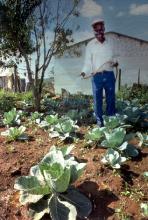South Africa: Water for productive livelihoods in South Africa's National Water Strategy
South Africa: Water for productive livelihoods in South Africa's National Water Strategy
| Title | South Africa: Water for productive livelihoods in South Africa's National Water Strategy |
| Publication Type | Web Article |
| Year of Publication | Submitted |
| Abstract | Echoing the earlier South African Department of Water Affairs and Forestry's recognition of the role of small-scale productive uses of water as an issue in water services delivery, the recent National Water Resources Stratgey specifically recognises this issue. |
| Full Text | Included in the strategy published in September 2004 is the following discussion on water for productive livelihoods: '"The objectives of the [National Water] Act are, among other things, to meet the basic human needs of present and future generations, to promote equitable access to water, and to redress the results of past racial and gender discrimination. The Department is committed to achieving these objectives, and particularly to ensuring that water management strategies contribute to the eradication of poverty. Although significant progress has been made in addressing the backlogs in water services, the provision of water to meet basic human needs does not make allowance for water for income-generating activities. Similarly, whilst prioritising allocations of water for emerging farmers and small grower forestry schemes, and revitalising defunct irrigation schemes has the potential to provide livelihoods for many people in rural areas, these do not address the needs of the large numbers of people who require water for small-scale activities such as, for instance, brick making, rearing poultry and growing produce for local sale. The quantities of water required are relatively small - research in small villages indicates that livelihoods can be significantly enhanced by the availability of 50 to 100 litres per household day. Although Schedule 1 provides for the use of small quantities of water without the need for further administrative authorisation it is restricted to domestic uses such as food gardens and domestic stock watering. As the Act currently stands water use under Schedule 1 supports subsistence activities but does not allow water to be used for commercial purposes. The requirements for water for small-scale uses in rural areas will be quantified during compulsory licensing (see below), and the Department will investigate ways of making secure and cost effective supplies of water available without placing unnecessary administrative burdens on the users. The requirements for water need not necessarily be met via piped supplies or using water abstracted from rivers. Rainwater harvesting from roofs or other hardened surfaces, using tanks, small check dams or catchpits can supplement more conventional sources of supply, and more use can be made of groundwater. Soil moisture can be retained on cultivated land and infiltration can be increased by contouring or constructing other micro water retaining structures, which have limited effects on water resources or downstream users. The Department will work closely with other government agencies, particularly agricultural extension services, and in partnerships with non-governmental organisations and the private sector to explore possible options and ensure that appropriate interventions are implemented.'' |

